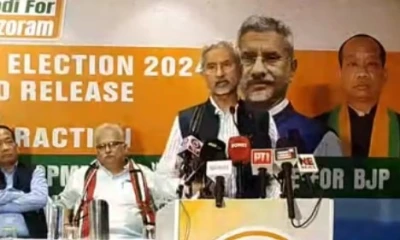External Affairs Minister S. Jaishankar explained the Indian government’s decision to terminate the Free Movement Regime (FMR) with Myanmar, citing the current turmoil in the neighboring nation. During a press interaction in Aizawl, Jaishankar emphasized that precautions have been necessary due to the unstable situation in Myanmar.
“If things were normal in Myanmar, this action would not have been taken. People should understand the circumstances,” Jaishankar remarked, underscoring the challenges posed by the ongoing unrest in Myanmar.
Jaishankar’s remarks came during his visit to Mizoram, where he was engaged in releasing the BJP’s election manifesto ahead of the Lok Sabha polls.
Highlighting the aftermath of the February 2022 coup in Myanmar, Jaishankar pointed out the proliferation of “bad practices and illegal activities” resulting from the lack of regulation in the neighboring country.
“Today, the conditions in Myanmar are very disturbed. In many cases, the authority of the government does not run. So, the security of our country, our State (Mizoram) requires us to take certain precautions. These are precautions we are taking in response to a certain situation,” elucidated Jaishankar.
Bharat and Myanmar share a boundary of 1,643 km in the four States – Mizoram, Manipur, Nagaland and Arunachal Pradesh. Mizoram, in particular, shares a 510 km border with the neighbouring nation. The two nations earlier shared a Free Movement Regime or FMR that allowed people living along the border to travel 16 km into each other’s territories without a visa.
On February 8, Union Home Minister Amit Shah declared the government’s decision to abolish the Free Movement Regime or FMR, aiming to uphold the internal security of the nation and preserve the demographic composition of Bharat’s Northeastern States.
In response, Jaishankar affirmed the government’s commitment to respecting the interests, customs, and traditions of the border communities, as well as maintaining amicable relationships across the border.
The inhabitants residing along the Bharat-Myanmar border predominantly hail from the Kuki-Chin-Zomi-Mizo tribe, sharing deep-rooted ethnic and kinship bonds that transcend national boundaries.
“We are looking at what was the earlier regime of free movement – for a certain pattern across the border. We have to wait and see, hopefully. Right now, our neighbour is going through a difficult phase. At some stage, things will become stable. That’s what we hope,” he said.
Besides, Jaishankar said the present situation in Myanmar has made it “very difficult” to work and complete projects crucial to both the countries.
Acknowledging the challenges, he said the government is trying to negotiate with various groups (ethnic armed organisations) in Myanmar to enable both sides to work smoothly.
“Because of the current situation in Myanmar, work has been very difficult. But what we are trying to do is negotiate with various groups…”

















